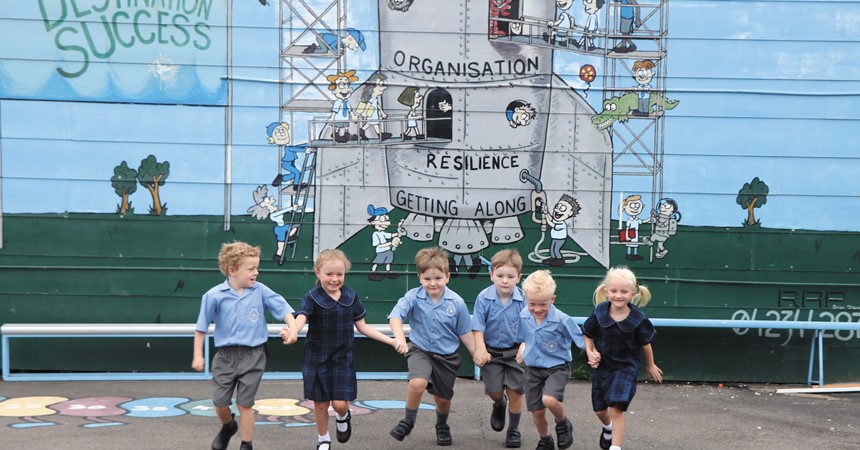No matter how many times teachers have engaged in transition practices, or how many children from a family have already started school, the transition is unique for the child. The changes which occur with transition are not only evident for children but for families as well.
Transition is not just to school, but from home and prior to school services (preschools, child care centres). It is a process of continuity and change as children move into their first year of school. The process happens over time, beginning well before the child begins school and extending to the time when the child and family feel a sense of belonging at school and when teachers recognise this.
In the past, transition had more of a ‘school readiness’ focus. ‘School readiness’ was traditionally thought of as a simple outcome of maturation or chronological age and was focused on the child’s skills. Once these were achieved, the child was considered ‘ready’ for school.
This view has been shown to be too limited. With such a mindset, the implication is that schools are not players in getting ‘ready’ to meet the capabilities and needs of the child. ‘Readiness’ does not reside solely in the child, but reflects the environments in which children find themselves: families, prior to school services, school and communities. If we use the term ‘readiness’, it is now represented by the following equation:
Ready families+ready prior to school services+ready communities+ready schools=ready children.
To add to the equation, there needs to be a ‘ready society’ which involves a wide understanding of the crucial importance of the early childhood years (birth to eight years) backed by governments, policies and funding. This includes an understanding of early learning philosophy and best practice.
I refrain from using the language of ‘readiness’ and concentrate on a more contemporary understanding of transition. There is a great deal of recent research about the transition to school. Recurring themes include:
- Children’s transition to school has implications for their learning at the time of transition and beyond
- Relationships are the foundation of positive transition to school experiences
- High expectations for all children, coupled with the recognition of their needs, strengths and capabilities
- Notions of readiness and transition are often conflated and much discussion still focuses on individuals’ skills as they start school.
There is no ‘one size fits all’ transition to school process as all school communities are different and processes evolve according to the local context. Effective school transition processes:
- involve experiences for children as well as parent/caregiver information sessions
- promote schools as safe and joyful places
- acknowledge that children have individual needs, capabilities and interests
- allow and encourage positive communication between children, families, prior to school services and school
- allow children to spend time in the school environment before starting school. It is important that there are sufficient experiences for children and families to begin to feel a connection to the school; however, not too many experiences that take children away from their current place of belonging.
Here are some ways in which families can support the child transitioning to school.
- Give your child time! There is no need to rush childhood!
- Give your child opportunities to play! Deep learning comes from play! Play produces positive academic, social, physical, creative, problem-solving and well-being outcomes.
- Don’t present starting school as the most wonderful and exciting thing that will ever happen − it may not live up to such lofty expectations!
- Know the importance of oral literacy. Use language to communicate, ask questions and listen to others.
- Enjoy books! Read to, and with, your child.
- Spend time outdoors and experience nature.
- Paint, draw, create and discover!
- Promote independence and self-help skills.
- Develop routines for morning procedures, afternoon pick-up, bedtime.
- Don’t overcrowd afternoon schedules. Your child will most likely be tired when beginning school.
- Become familiar with what’s needed for school such as uniform, bag, lunch box.
- Provide honest information to the school about your child.
Ask an educator at your child’s prior to school service to complete the NSW Transition to School Statement. The statement summarises the child’s strengths, interests and approaches to learning and suggests ways these can be supported to continue learning. The prior to school educator, family and the child can contribute to the statement.
Children who have a positive start to school are more likely to engage fully and experience academic and social success. This places great responsibility on all stakeholders to support the child transitioning to school. It’s a time of new beginnings and adventures, to be embraced and celebrated.
Kim Moroney is Project Officer (Early Learning) and the winner of the Br John Taylor Fellowship 2017.























































































